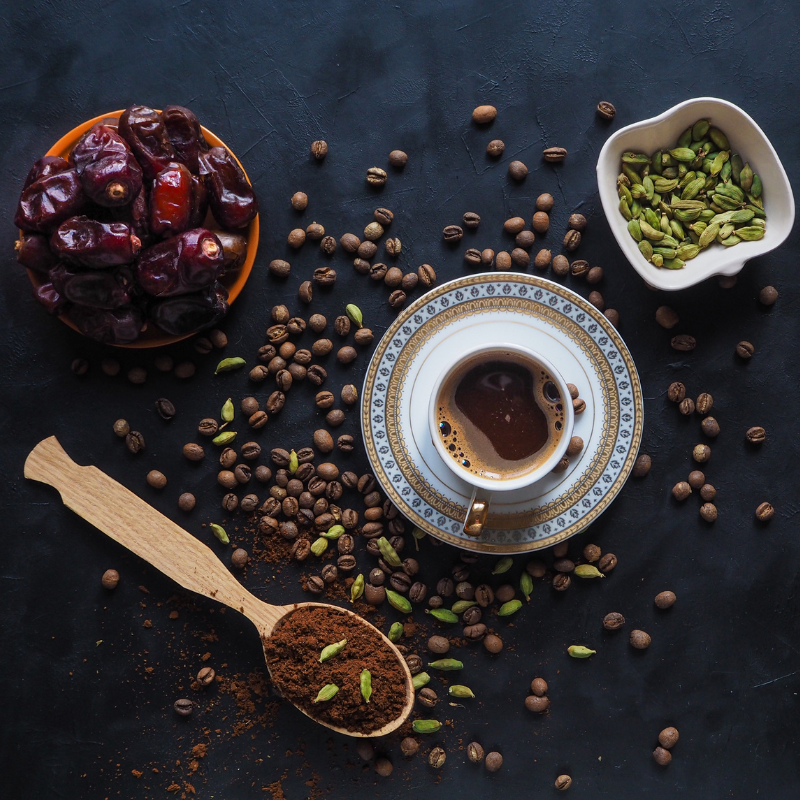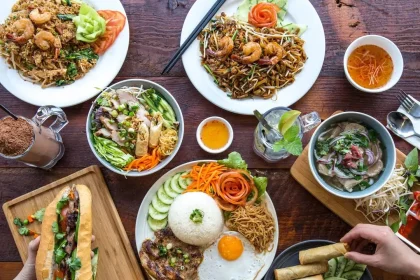Traditional Arabic coffee, or “Gahwa,” is not just a beverage; it’s a symbol of hospitality, culture, and history in the Arab world. This cherished tradition reflects the warmth, generosity, and social customs of the Middle East, where preparing and serving coffee is an art form passed down through generations. This article explores the rich history, unique preparation methods, and cultural significance of traditional Arabic coffee.

A Historical Overview
The roots of Arabic coffee trace back to the 15th century in Yemen. Coffee beans, initially discovered in Ethiopia, were cultivated and brewed by the Arabs who perfected the roasting and brewing processes. From the Arabian Peninsula, coffee spread across the Middle East and eventually reached Europe and beyond, shaping global coffee culture.
In Arab society, coffee is much more than a daily ritual; it represents social connection and hospitality. The traditional methods of making and serving Arabic coffee have deep cultural significance, making it an essential part of Arab heritage.
Unique Preparation of Traditional Arabic Coffee
Traditional Arabic coffee is distinct from its Western counterparts, with specific ingredients and preparation methods that create its unique flavor and aroma. Key ingredients include lightly roasted Arabica coffee beans and cardamom, with optional additions like saffron or rose water for extra fragrance.
Ingredients
- Arabica coffee beans: Lightly roasted to maintain their delicate flavor.
- Cardamom: Adds a spicy, aromatic note to the coffee.
- Saffron or rose water: Optional for enhanced fragrance and taste.
Preparation Method
Roasting and Grinding
Coffee beans are lightly roasted to a pale brown color. After roasting, they are ground into a fine powder using a mortar and pestle or a modern grinder.
Boiling the Coffee
Water is boiled in a special pot called a “dallah.” Ground coffee and crushed cardamom pods are added to the boiling water, and the mixture is simmered to extract the flavors.
Straining and Serving
The coffee is strained to remove grounds and cardamom residue. It is then poured into small, handle less cups called “Finjan,” typically filled halfway to cool quickly and allow multiple servings.
Cultural Significance
Serving traditional Arabic coffee is a gesture of hospitality and respect. In Arab culture, welcoming guests with coffee is a deeply rooted custom that demonstrates generosity and social etiquette. The rituals associated with serving coffee are rich in cultural meaning and vary slightly by region.
Hospitality and Social Etiquette
When guests arrive, they are often greeted with Arabic coffee and dates or sweets. The host’s skill in preparing and serving coffee is a point of pride and a way to honor guests. The serving process follows a specific etiquette:
Order of Serving: The eldest or most honored guest is served first, followed by others in order of seniority.
Small Portions: Coffee is served in small amounts to encourage multiple servings and facilitate conversation.
Refilling the Cup: Guests typically accept at least one cup and signal they have had enough by gently shaking the empty cup when returning it to the host.
Respect and Gratitude: Mutual respect is shown through the coffee ritual, with the host demonstrating generosity and the guest showing appreciation.
Symbol of Unity and Heritage
Arabic coffee symbolizes unity and cultural heritage across the Arab world. It is enjoyed by people of all social and economic backgrounds, fostering a sense of community and continuity. This shared tradition strengthens cultural bonds both within the Middle East and among the Arab diaspora.
Explore More Quad Biking in Dubai: Conquer the Desert Wilderness
Role in Festive Occasions
Arabic coffee is integral to festive occasions such as weddings, religious celebrations, and national holidays. During these events, the preparation and serving of coffee are carried out with great care, reflecting its cultural importance and the desire to honor guests.

Global Appeal
In recent years, the appeal of traditional Arabic coffee has grown internationally. As people become more interested in diverse cultures, Arabic coffee is gaining recognition for its unique flavor and cultural significance.
Coffee Houses and Cultural Exchange
Coffee houses specializing in Arabic coffee are appearing in cities worldwide, offering an authentic experience complete with traditional music, decor, and hospitality. These establishments provide a glimpse into Arab culture and the art of coffee making.
Culinary Tourism
Culinary tourism has also boosted the popularity of Arabic coffee. Travelers seeking authentic cultural experiences often participate in coffee ceremonies and workshops, learning about the art of making and serving Arabic coffee. These experiences deepen appreciation for Arab culture and hospitality.
Conclusion
Traditional Arabic coffee is a cultural treasure that embodies the values of hospitality, respect, and social connection. Its rich history, unique preparation methods, and cultural significance make it an enduring symbol of Arab heritage. As global interest in diverse cultures continues to grow, the appreciation for Arabic coffee will likely expand, bringing people together over this timeless tradition. Whether enjoyed in a traditional Arab home or a modern coffee house, Arabic coffee remains a testament to the enduring power of cultural traditions and the simple pleasure of a well-prepared cup of coffee.








